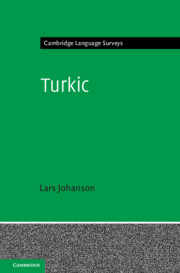Book contents
- Turkic
- Cambridge Language Surveys
- Turkic
- Copyright page
- Contents
- Figures
- Maps
- Tables
- 1 Introduction
- 2 Technicalities
- 3 The Turkic Language Family
- 4 Turcia, the Turkic World
- 5 Status
- 6 Historical Backgrounds
- 7 Cultures
- 8 Linguistic Periodizations
- 9 Registers of Orature and Literature
- 10 Language Contacts
- 11 Lexicon
- 12 Sound Types
- 13 Prime Syllables
- 14 Phonemes in Prime Syllables
- 15 Polysyllabic Word Forms
- 16 Diachronic Phonology
- 17 Diachrony: Vowels
- 18 Diachrony: Consonants
- 19 Writing Systems
- 20 Morphology: Generalities
- 21 Nominals: Nouns
- 22 Nominals: Noun Inflection
- 23 Nominals: Adjectives
- 24 Nominals: Pronominals
- 25 Quantifiers and Numerals
- 26 Postpositions
- 27 Copular Devices
- 28 Verb Stems
- 29 Postverbial Constructions
- 30 Finite Verbals
- 31 Verbals: Viewpoint Aspect
- 32 Old Intraterminals: Aorists
- 33 Focal Intraterminals
- 34 Postterminals
- 35 Terminals
- 36 Imperatives
- 37 Modality
- 38 Voluntatives
- 39 Optatives
- 40 Hypotheticals
- 41 Further Modals
- 42 Copular Particles of Thematic Bases
- 43 Nonfinite Verbals
- 44 Participant Nominals
- 45 Action Nominals
- 46 Converbs
- 47 Adverbs
- 48 Function Words
- 49 Interjections
- 50 Word Accents
- 51 Syntactic Levels
- 52 Nominal Phrases
- 53 Verbal Phrases
- 54 Main Clauses
- 55 Nonmain Clauses
- 56 Sentences
- 57 Above the Sentence Level
- 58 Prosody
- 59 Functional Synopses
- References
- Index of linguistics and historical backgrounds
- Index of languages and dialects
- Index of subjects
21 - Nominals: Nouns
Published online by Cambridge University Press: 13 August 2021
- Turkic
- Cambridge Language Surveys
- Turkic
- Copyright page
- Contents
- Figures
- Maps
- Tables
- 1 Introduction
- 2 Technicalities
- 3 The Turkic Language Family
- 4 Turcia, the Turkic World
- 5 Status
- 6 Historical Backgrounds
- 7 Cultures
- 8 Linguistic Periodizations
- 9 Registers of Orature and Literature
- 10 Language Contacts
- 11 Lexicon
- 12 Sound Types
- 13 Prime Syllables
- 14 Phonemes in Prime Syllables
- 15 Polysyllabic Word Forms
- 16 Diachronic Phonology
- 17 Diachrony: Vowels
- 18 Diachrony: Consonants
- 19 Writing Systems
- 20 Morphology: Generalities
- 21 Nominals: Nouns
- 22 Nominals: Noun Inflection
- 23 Nominals: Adjectives
- 24 Nominals: Pronominals
- 25 Quantifiers and Numerals
- 26 Postpositions
- 27 Copular Devices
- 28 Verb Stems
- 29 Postverbial Constructions
- 30 Finite Verbals
- 31 Verbals: Viewpoint Aspect
- 32 Old Intraterminals: Aorists
- 33 Focal Intraterminals
- 34 Postterminals
- 35 Terminals
- 36 Imperatives
- 37 Modality
- 38 Voluntatives
- 39 Optatives
- 40 Hypotheticals
- 41 Further Modals
- 42 Copular Particles of Thematic Bases
- 43 Nonfinite Verbals
- 44 Participant Nominals
- 45 Action Nominals
- 46 Converbs
- 47 Adverbs
- 48 Function Words
- 49 Interjections
- 50 Word Accents
- 51 Syntactic Levels
- 52 Nominal Phrases
- 53 Verbal Phrases
- 54 Main Clauses
- 55 Nonmain Clauses
- 56 Sentences
- 57 Above the Sentence Level
- 58 Prosody
- 59 Functional Synopses
- References
- Index of linguistics and historical backgrounds
- Index of languages and dialects
- Index of subjects
Summary
The Turkic declinable word class noun (substantive, nomen substantivum) refers to concrete and abstract entities, i.e. humans, animals, things, and intangible phenomena such as actions, qualities, concepts, etc.
- Type
- Chapter
- Information
- Turkic , pp. 440 - 451Publisher: Cambridge University PressPrint publication year: 2021

